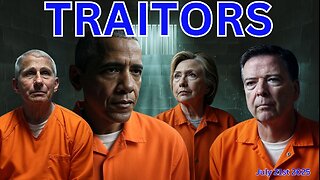Premium Only Content

Deadliest nightclub fire in history
Movie stars. Artificial palm trees. Big band music. The night of November 28, 1942, promised all the glamour and glitz that made Boston’s most famous night spot, The Cocoanut Grove, legendary. That night, about a thousand revelers gathered to drink and dance the night away.
Just hours later, the club would be no more, reduced to a smoldering husk by a five-alarm fire. Nearly 500 people died at The Cocoanut Grove that night in the United States’ most deadly nightclub disaster. The fire was the product of a hardened entrepreneur’s greed—but for years, a young bus boy would bear the blame.
By the time of the fire, The Cocoanut Grove was a Boston institution. Singer Mickey Alpert and bandleader Jacques Renard had opened the club near Boston’s theater district in 1927, at the heyday of live music and theater. Despite the club’s prime location, it was a risky proposition. It was the height of Prohibition in the United States, and alcohol was banned. But Alpert and Renard were convinced that great music and live acts would bring people to the club even though it didn’t serve alcohol, andinsisted that the club adherhe to the strict liquor laws of the day.There was just one problem: Their financier, Jack Berman, was not what he seemed. Berman was a pseudonym used by Jack Bennett, a fallen oil investor who saw the club as a way to launder money he had stolen by manipulating the stock market. The owners decided to refuse Bennett’s money and finance the club themselves. That unexpected expense, the daily grind of financing the club, and their financial inexperience meant that they were soon nearly bankrupt despite the club’s success. They sold the club to Charles “King” Solomon, a gangster, for $10,000 in 1931 (about $155,000 in today’s money).
Solomon had different ideas about how to run the venue. He turned it into a speakeasy frequented by gangsters—until he found himself on the wrong end of a gun in 1933, when a rival murdered him in the restroom of another club. That’s how The Cocoanut Grove ended up in the hands of Barney Welansky, Solomon’s lawyer.
In a bid for more customers, Welansky decided to try to rid The Cocoanut Grove of its gritty reputation. He invested in tiki-style decor to go along with the club’s name and convinced mainstream acts to play. Alpert became the club’s emcee, performing and running its shows.
On the surface, The Cocoanut Grove was a popular, glamorous hangout for Boston’s elite and visiting public figures and movie stars. But despite its veneer of respectability, Welansky’s club was largely an expensive-seeming facade for a business that ignored building codes, hired gangsters, thugs, and unlicensed workers, and cut corners wherever possible. Its lavish-looking palm trees were made of cheap, flammable material and its ambience was largely due to inexpensive hanging canopies. Welansky, who had close ties to Boston’s mayor, was known to brag that he didn’t need to obey the building code. He nailed some exits shut so customers couldn’t sneak out without paying for their drinks. And he often hired underage or underpaid workers.
One of those workers was a bus boy named Stanley Tomaszewski, a high schooler who worked nine-hour shifts at the club for $2.47 (about $38 in today’s money) plus tips. On the night of the fire, as football fans, the cast of a popular nearby musical, and even a movie star—Hollywood cowboy Buck Jones—crowded into the club, a bartender ordered Tomaszewski to change a lightbulb atop one of the fake palm trees in the downstairs portion of the club. The bartender had noticed a serviceman unscrewing the bulb so he could kiss his date in the dark.
What happened next may never be known.Witness statements varied as to whether the bartender had asked the boy to replace the bulb, whether he did so, and whether he lit a match while doing so to see better in the darkened corner. But the results were immediate: The tree burst into flames, and one of the satin canopies that hung from the ceiling caught on fire.
Waiters tried to put out the fire, but within an instant the whole club was ablaze.
-
 LIVE
LIVE
Bannons War Room
5 months agoWarRoom Live
17,486 watching -
 LIVE
LIVE
Matt Kohrs
9 hours agoMarket Open: New Highs, Tesla Stock Skyrockets & The Week Ahead || Live Trading
1,167 watching -
 LIVE
LIVE
VSiNLive
34 minutes agoA Numbers Game with Gill Alexander | Hour 1
79 watching -
 LIVE
LIVE
Rethinking the Dollar
12 minutes agoMonday Morning Check-In: Let's Talk...
48 watching -
 1:10:13
1:10:13
Dear America
2 hours agoTrump EXPOSES Obama RUSSIA RUSSIA RUSSIA HOAX!! SEND THEM ALL TO JAIL!!!
93.1K74 -
 LIVE
LIVE
Badlands Media
8 hours agoBadlands Daily: July 21, 2025
5,238 watching -
 LIVE
LIVE
Wendy Bell Radio
6 hours agoTRAITORS.
10,658 watching -
 LIVE
LIVE
GritsGG
2 hours agoWin Streaking! Most Wins 3100+! 🔥
94 watching -
 12:21
12:21
Bearing
2 hours agoStephen Colbert: Another UNEMPLOYED Woke Loser 🤣🦀
6.83K13 -
 1:01:14
1:01:14
The Finance Hub
19 hours ago $0.44 earnedI CAN'T BELIEVE WHAT JUST GOT REVEALED ABOUT PAM BONDI!!!
3.6K8